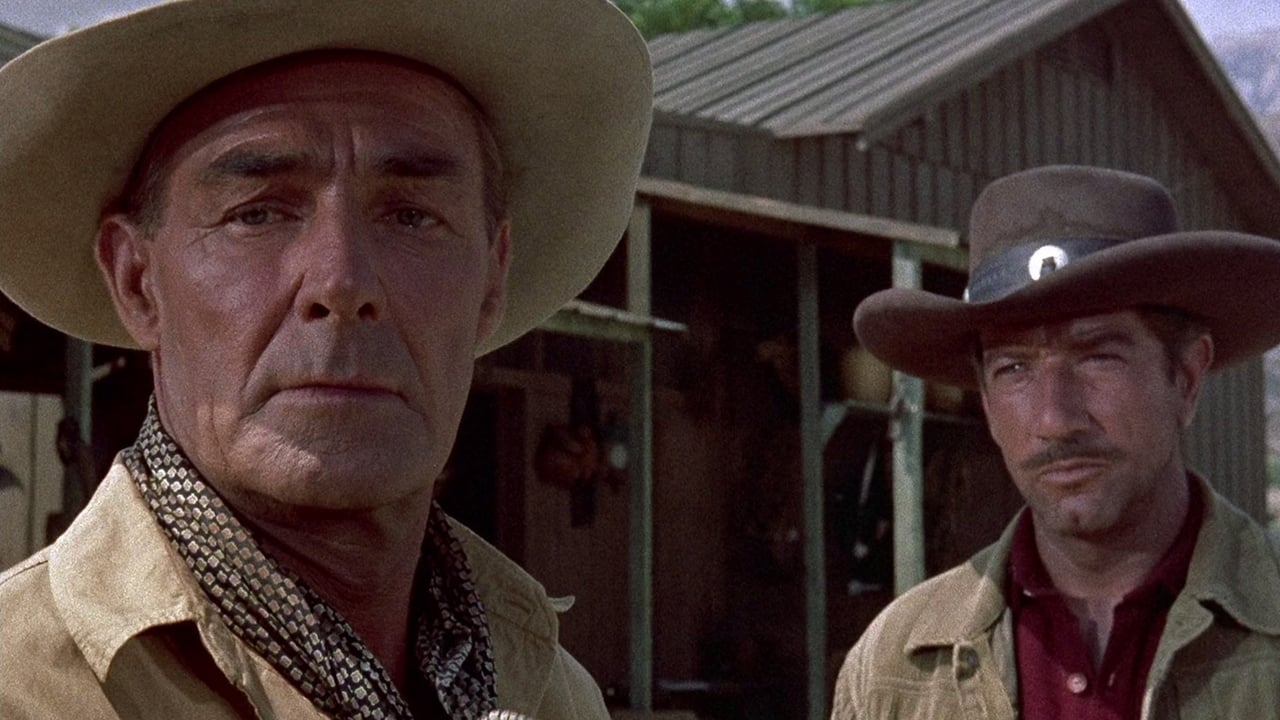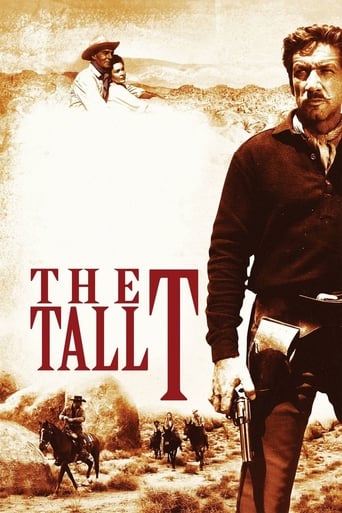

Awesome Movie
... View MoreBlending excellent reporting and strong storytelling, this is a disturbing film truly stranger than fiction
... View MoreAmazing worth wacthing. So good. Biased but well made with many good points.
... View MoreMostly, the movie is committed to the value of a good time.
... View MoreThe great thing about "The Tall T" is that, unless you are one of those people who reads up on a movie before seeing it, you have no idea where it is going for the first 20 or so minutes. As you shouldn't; it spoils some of this film's brilliance otherwise.We meet Brennan (Randolph Scott) in the middle of his day; passing the time with the manager of a stage post and his son, riding into the town of Contention, going to a ranch to try and buy a seed bull off its owner. All this time, director Budd Boetticher and scriptwriter Burt Kennedy are setting you up for the real story, which begins when Brennan comes back to the stage post to discover something wrong And if you haven't seen this movie, stop right there and watch it before continuing. You'll thank me later.You can find a lot of opinions here and elsewhere as to whether "The Tall T" is Boetticher's best movie in his Ranown cycle of westerns featuring Scott. I don't think it's my favorite, but it may well be the most challenging and rewarding of them, just for the way it unfolds so meticulously from amiable oater to become so dark and tense. At bottom, it's a Hemingway-esque reflection on a life of solitary action as seen through the very different perspectives of two men, Brennan and Usher (Richard Boone), both of whom seek to use the same woman, a Mrs. Mims (Maureen O'Sullivan), to opposing ends.A question keeps coming up in these reviews: Why does Usher keep Brennan alive? It's an important question, one the whole movie hinges upon. Watching their first meeting again, the moment becomes pretty clear. Brennan's stoic bravery impresses Usher, whom we learn later hasn't been around a lot of decent people in a while and kind of misses that. There's an early exchange, where Mr. Mims tries to talk his way out of trouble with Usher, saying he won't breathe a word about any lawbreaking. Usher asks Brennan if that goes for him, too."If I said yes, you wouldn't believe me," answers Brennan.Usher grins, more than a little: "Yeah, it's dumb even talking' 'bout it, ain't it?" You can see he's impressed by Brennan, and more so a bit later on when Brennan owns up to being scared about his situation.This is a fantastic acting forum for both Scott and Boone, actors who benefited most when saying less. Brennan is the classic man of few words, even early on when "The Tall T" is putting on its falsely amiable front. Later, making conversation with his fellow captive and their captors, Brennan is even more terse: "It hadn't been my day." Or this three-word verdict on one character that says it all: "He ain't much." My favorite, when addressing one bad guy played by Henry Silva who brags he just killed his seventh victim: "When you figure on eight and nine?"Usher is cruel, but more from habit than bent. He responds to Brennan's tough honor with palpable respect, and even shows kindness to Mrs. Mims. But he's a cruel man, still.The movie isn't without flaws. The music is overbearing and the ending too perfunctory. But the visual design and cinematography by Charles Lawton, Jr. are splendid, suggesting a bullfighting arena as Jeanine Basinger points out in her excellent, cant-free DVD commentary. O'Sullivan and Silva along with Skip Homeier as Usher's other henchman all give excellent support, making this a film that with its actors, as with its dialogue, does more with less.
... View MoreThe Tall TThis Budd Boetthicher/Randolph Scott project is overrated. I'll admit it's watchable and certainly has merit, but at the end of the day it's a middling movie riddled with faults. As usual, I'll start with some positives:I'm a big Richard Boone fan and this no doubt one of his better parts. He's plays Frank Usher, the heavy, who is conflicted over his outlaw status and is especially unhappy with his lack of intelligent, honorable companionship.The plot pretty much makes sense from beginning to end, which is saying a lot for this type of movie. It moves along pretty well and maintains a good level of dramatic tension.Henry Silva is quite effective as "Chink", the outlaw band's stock crazy gunman. He played a similar kind of character a year later in "The Law And Jake Wade".The presence of Skip Homeir is interesting. He was the heavy in "The Gunfighter" five years earlier.Randolph Scott, as usual, is modestly effective as the leading man.This was shot almost entirely on location. There are very few sound stage scenes.Willard Mims, the cowardly bounder, is well characterized and the part is well acted by John Hubbard.Here's some of the things that kept this movie from being better:In the opening scene, great pains are taken to deeply characterize a man and little boy who run a remote stagecoach station. Later in the day - about 15 minutes of move time later - they are brutally gunned down and their both their bodies are dumped in a well right in front of the station. Fortunately, this happens off camera. Nonetheless, this is extremely grisly and out of sync with the tone of the rest of the movie.Scott's Pat Brennan is the hero, but starts out the movie by riding 30 miles from his ranch to a place where he loses his horse in a foolish bet, forcing him to walk home. Is this the clever guy we are counting on to outwit the outlaw gang?Also, about that bet. Wouldn't his former boss have allowed him to ride the horse he lost home, and return later with two horse? Or loan him a horse? The guy is trying to get Pat to come back to work for him. Why make him walk home 30 miles carrying a saddle?Attempts to make Pat Brennan seem like a super nice, friendly and easy going fellow fall very flat.The story is supposed to be set in New Mexico or Arizona and is clearly filmed in California.There's no way Pat Brennan would have allowed Frank Usher to mount his horse in the final scene. Every cowboy in the universe carries a rifle on his horse. Also, he would have not allowed Usher to walk away. He had murdered the little boy and man at the station, as well as his "buddy" the stagecoach driver. Pat didn't have to kill him to stop him, just shoot him in the leg.There is very little attempt at comic relief.No Indians, no Mexicans, no civil war references, some of the things I like to see referenced in Westerns.The ending is too abrupt. I guess the "guy got the girl" in the end, but this feels contrived.
... View MoreRandolph Scott is arguably at his peak in The Tall T. Close to sixty when the film was released, he is one of only a handful of leading men in Hollywood that could still parlay his looks up to that (by Hollywood standards) advanced age. Scott was blessed with good scripts in the Fifties. His films with director Budd Boetticher (such as Seven Men From Now and Buchanan Rides Alone) were heads above most of the oaters of that time.You will notice Scott as Pat Brennan begins the film as a very happy-go-lucky fellow, not a role Scott often did; in fact I can think of no other movie where he is such a likable sort. He loses a spur-of-the-moment bet early on, yet he remains cheerful despite that loss. But after the capture of the stagecoach on which he is a passenger by a serious gang of cutthroats, things take a decided turn for the worse. His fellow passengers (and hostages) are a pair of newlyweds. Even the dynamic between these two becomes interesting.In spite of the serious disadvantage Pat has, he presses his captors at all times, looking for opportunities to correct the situation. How he manages to work through his (their) plight is for you to observe. There is a scene of terrific violence in the closing moments, and Scott's remonstration to bystander Doretta (the newlywed, played well by Maureen O'Sullivan) is sage advice.The Tall T was filmed, like many Westerns, in the beautiful Alabama Hills just east of Mount Whitney. There is no other location like it, and I can usually, sometimes instantly, recognize that area from just a few frames of a film.Any Randolph Scott Western is worth viewing, this more so than most.Rating: Three stars
... View MoreFormer cowboy-turned-rancher Randolph Scott loses his horse in a bet and hitches a ride back home with a private coach carrying the daughter of a wealthy businessman and her sniveling new husband; of course they run afoul of bloodthirsty crooks who, upon learning of the woman's background, hold the travelers for ransom. Revered western director Budd Boetticher, working from a script by Burt Kennedy via Elmore Leonard's original story, creates great tension and excitement during the suspenseful final stages. Unfortunately, Boetticher and Kennedy get the picture off to an ugly start with the murder (off screen) of an innocent widower and his little boy--and also a friendly coach driver--their bodies ditched in a well. There is nothing more despicable than introducing characters simply as an excuse to have story-victims...and just because Boetticher doesn't show their killings doesn't make him more noble. These people never even get a chance to defend themselves, to fight back, and nobody mentions them again. Scott, alternately smiling and scowling, is a contemplative hero, and magnetic Richard Boone gets to display different shades to his gang-leader. Still, the film is unapologetic in the worst way; it's brutal all right, but the indifference of the general handling is tough to shake off. **1/2 from ****
... View More